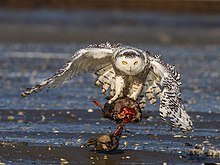Predation problem
Some critics have considered an obligation to prevent predation as untenable or absurd and have used the position as a reductio ad absurdum to reject the concept of animal rights altogether.
[6] Others have asserted that it is not something that we should do anything about now due to the risk that we could inadvertently cause significant harm, but that it is something that we may be able to effectively take action on in the future with improved knowledge and technologies.
"[14] In his notebooks (written between 1487 and 1505), Leonardo da Vinci questioned why nature was not structured in a way which meant that animals were not forced to consume each other to survive.
[15] David Hume made several observations about predation and suffering experienced by wild animals in Dialogues Concerning Natural Religion (1779), stating that the "stronger prey upon the weaker, and keep them in perpetual terror and anxiety".
[26] The American zoologist and animal rights philosopher J. Howard Moore in the pamphlet Why I Am a Vegetarian, published in 1895, described the carnivora as "relentless brutes", whose existence is a travesty for ethics, justice and mercy.
[27] In Better-World Philosophy (1899), Moore argued that carnivorousness was the result of excessive egoism, a product of natural selection, stating "Life riots on life—tooth and talon, beak and paw".
[28]: 161–163 In The New Ethics (1907), Moore labelled carnivorous species as "criminal" races whose "existence is a continual menace to the peace and well-being of the world" because the "fullness of their lives is dependent upon the emptiness and destruction of others".
He considered this proposal absurd, stating that the "declaration of the rights of every creeping thing [is] to remain a mere hypocritical formula to gratify pug-loving sentimentalists".
[31] The English philosopher Stephen R. L. Clark's "The Rights of Wild Things" (1979) is considered to be one of the first ethics papers to explicitly engage with predation as a problem.
In a 2003 paper, the economist Tyler Cowen advocates, from a utility, rights and holistic perspective, for the policing of nature to reduce the predatory activity of certain animals to help their victims.
Pearce lists and argues against a number of justifications used by people who think that suffering caused by predation does not matter and that it should be conserved in its current state, including a "television-based conception of the living world", "[s]elective realism" and "[a]daptive empathy deficits".
[48] Under Aldo Leopold's land ethic, native predators, as crucial components of biotic communities, are considered important to conserve.
"[50] Holmes Rolston III views predation as an essential natural process and driver of evolution, that is a "sad good" to be respected and valued.
